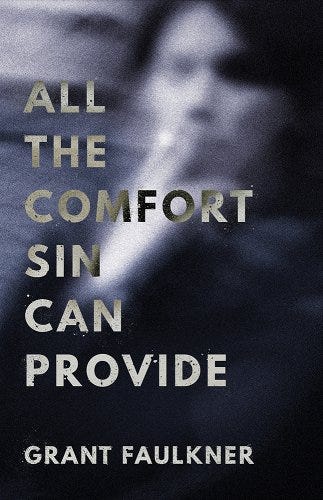Because let’s start with a quote
—You know what question really drives me insane … and it happens every goddamned time: “How do you know when it’s finished?”
—Well, sometimes it’s hard to tell …
—She’s talking about a Jackson Pollock we saw at a gallery.
—Yeah. Why not three splatters less, or two more?
—That’s what makes Pollock Pollock, right? He can just stare at it and say: “That’s it. It’s complete. It’s finished.” That’s what makes you an artist.
~ Billions, season 5, episode 7 (poached from The Art of Revision, by Peter Ho Davies)
Because it’s hard to hear others when you’re listening to yourself
Humans want to be known. We want to be seen and heard and understood. It’s a fundamental life force, nearly as strong as the need to eat and breathe.
Which is why it’s so frustrating to be interrupted.
I have a friend who interrupts me a lot. Fortunately, she interrupts me out of pure gusto, out of the exuberance to riff on what I’ve said. But still. It never feels good.
What interests me is that she’ll often interrupt to finish my thought with an assumption about what I’m getting at, but she’s usually wrong.
The last time this happened, it made me think about how much we live through our projected stories. I’m sure there’s some evolutionary reason this trait gives us an edge in survival, but what strikes me is that we’re all doing a lot of talking, but not a lot of listening, which means that we’re all trying to be heard and understood, but we’re not really being heard and understood.
It’s like we’re singing opera to an audience that isn’t really there. Or they’re only half there. So we’re living in a misperception.
I know I’ve done my share of interrupting. I know I was the boy in the class who was so excited to have the answer to a teacher’s question that he shouted out the answer. I know I’ve talked over people in arguments or seized the storytelling center at dinner parties with some sort of puerile need of attention or stupid one-upmanship.
But I’ve been practicing listening of late. Here’s what I’ve discovered: It’s really hard. Because you usually don’t get to talk much. It’s like when I went out for 5th-grade basketball. “Don’t be a gunner,” my father told me before the first practice. “Pass the ball.” That’s great basketball advice, but it doesn’t work with 5th graders. I passed the ball, and then I never got it back. Because everyone else just wanted to take shots.
I’ve read that the more familiar we are with people, the more likely we are to not listen to them. Because of how much we think we know them, we tend to finish their sentences because we think we know what they’re going to say. Except we don’t. Because everyone holds surprises, right?
I think about the poet Mary Oliver’s quote, “Attention is the beginning of devotion.” I think about how nothing means much without the right kind of devotion. Which means paying attention to our attention, but also paying attention to our inattention.
One of the main things I like to write about is the role of the unsaid and the unheard in our lives. Many of us are lonely or feel misunderstood, and that’s what is behind so much of what we do: our desire to be seen for who we are.
I think of Wittgenstein’s idea that the inexpressible is contained in the expressed. You have to listen really hard to hear the unexpressed.
I recently saw the movie Drive My Car, which is my favorite movie of 2021. Part of the movie is about a multi-lingual production of Uncle Vanya. Actors speak in a mix of Japanese, Mandarin, Korean—and even Korean sign language. The director Ryûsuke Hamaguchi seems to ask, how much do people speaking the same language really understand each other?
Here’s my challenge (for you and me): listen for the surprises another might reveal instead of what you think you know.
Here’s another challenge: go through an entire conversation or meeting and only listen. Don’t say a word about yourself. It’s an adventure.
(I guess I’m obsessed with attention because I wrote about it in an earlier newsletter.)
Because salvation
Since it's Sunday ... I recently read that the actual theological meaning of the word "salvation" is meaning.
So salvation isn’t something delivered by a god or something you achieve through acts of goodness, it’s simply the pursuit to find meaning.
That’s nice to hear because that’s the most fundamental reason why I write. Which means writing is a holy endeavor. It is divine.
Because a haiku
I remember firelight
and you remember
smokeBecause prompts take us to new places
I went to a rodeo in Colorado a few years ago. If you’re ever looking for a place to take photos, a rodeo is a really good place to do it.
Use this photo as a prompt, as a random catalyst, as an igniter for any writing project you're working on.
Or … write a story about this photo in less than 300 words and share it.
Because this is what I watch to when I’m really depressed
This video of Nicki Bluhm and the Gramblers makes me think of my favorite times in my younger years when all of life felt like getting in cars with friends and driving around and singing with sunglasses on. I save it as an escape pill when I’m down, down, down.
Because I like talking about my new book (and I’m a narcissist)
I just did this interview with Darley Stewart in the Adroit Journal. I talked about sin, and the Bible, sin, and the Bible, and my stories, and writing through snapshots, and Denis Johnson, and how every alcoholic is just a seeker who got on the wrong path (hat tip to Carl Jung).
“I think my characters generally look to sin as a way to feel alive. They sin as a part of their seeking, and their sin can even be akin to reaching for something holy because they want to go beyond their lives, but they’re often seeking in misguided ways. As Jung said, inside of every alcoholic there’s a seeker who got on the wrong track.”
All the Comfort Sin Can Provide
If you like this newsletter, please consider checking out my recently released collection of short stories, All the Comfort Sin Can Provide.
Lidia Yuknavitch said:
“Somewhere between sinister and gleeful the characters in Grant Faulkner’s story collection All the Comfort Sin Can Provide blow open pleasure—guilty pleasure, unapologetic pleasure, accidental pleasure, repressed pleasure.”
Grant Faulkner is executive director of National Novel Writing Month and the co-founder of 100 Word Story. He’s the author of Pep Talks for Writers: 52 Insights and Actions to Boost Your Creative Mojo and the co-host of the podcast Write-minded. His essays on creative writing have appeared in The New York Times, Poets & Writers, Lit Hub, Writer’s Digest, and The Writer.
For more, go to grantfaulkner.com, or follow him on Twitter at @grantfaulkner.






Powerful! Thank you Grant! So much to think about, improve on and reread. Narcissists tend to fail to look inside and take time doing the hard work it takes to change for the better. That would mean you are excluded from that spectrum in my opinion. The attention to inattention is haunting and good to dig, dig, dig into and a bigger shovel is needed over here. Interruptions; i hate realizing it is happening and try to question the aggression and think more before speaking-doing that can interrupt listening too. Ugh! Listening is worth the work. Thank you again! Power!
Linda Gilmour Cortese
While taking speech class in college it came with a listening lab. Very interesting and challenging to be an active listener to different types of speakers, topics, environments. Learned a lot. Your challenge reignites that memory and reminds me to apply what I learned, TY